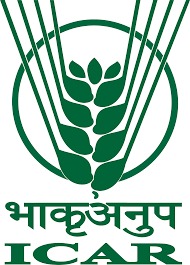Research Achievements
Apart from producing breeder, foundation and certified seed of paddy, wheat, pulses and oilseeds, the Institute has generated invaluable scientific information and also developed user-friendly agro-techniques.
- Identified and validated 13 unique SRR/ ILP markers for hybridity and genetic purity determination in field/ horticultural crops (paddy, sunflower, cotton and onion).
- DNA based protocols (conventional PCR and RT-PCR) developed for detection of seed borne pathogens (BCMV in common bean and PMMV, truncatum, C. coccodes in capsicum).
- The ‘ROS mediated lipid peroxidation and PCD pathway’ associated with groundnut seed deterioration was studied using FT-IR, TLC, DSC-TGA, AFM and SEM techniques; and a ‘Model for seed deterioration in groundnut’ has been accentuated.
- Recommendations on isolation distances (field standards) in crops viz. pearl millet (C/S) – 200 m; sorghum (C/S) – 100 m; rape seed and mustard (F/S & C/S) – 200 m & 50 m; pigeon pea (F/S) – 250 m have been incorporated in IMSCS, 2013.
- Optimized seed production technology for green manure crops (dhaincha, pillipesera & sunhemp) and integrated approaches for maximizing seed yield and quality in eleven field crops.
- Seeds of paddy, onion, soybean and sunflower stored in airtight polythene bags (700 gauge) along with desiccant beads (zeolite beads/silica gel) @ 5g/kg seed-maintained seed quality even after 6 months of storage.
- Developed quick method for testing genetic purity of large samples through molecular markers. Three patents have been filed related to technologies for assessing the genetic purity of seed stocks:
- 179/DEL/2014 – named “Three Way Matrix Gun” for carrying out three-way sampling method for assessing genetic purity to seed lot.
- 180/DEL/2014 – named “Three Way Matrix Gun” for testing genetic purity of crop plants at hybrid seed production field and identify the contaminants if any.
- 181/DEL/2014 – named “Matrix Assisted Multirex Assay” for testing genetic purity of crop plants and seed lot.
- Standardized seed priming technology for enhancing seed quality and yield in mung bean (Mg(NO₃)₂ @ 30 mM), pigeon pea (KNO₃ @ 0.3%) and wheat (KNO₃ @ 0.2%).
- Identified nine potential strains of rhizo-bacteria used for development of talc-based formulations. These formulations were employed for bio-priming and root dipping in rice and chickpea. Rice seed treated with strain Brevibacterium halotolerans were found to be best in enhancing seed vigour in rice. Among all treatments, root dipping method gave the better results.
- Developed integrated practices for management of seed borne diseases viz. Alternaria blight in tomato; Alternaria leaf spot in sunflower; pod blight in soybean caused by Colletotrichum dematium; fruit rot of chilli caused by Colletotrichum capsici and Alternaria alternata.
- Survey revealed the contribution of formal and informal seed sector in total seed supply in the country in the ratio of 64:36 (cereals- 67:33, pulses- 57:43 and oilseeds- 52:48).
- Impact assessment studies pertinent to quality seed production under farmer’s participatory revealed that net monetary returns from seed production was 62, 40, 44 and 81 per cent higher than grain production in crops viz. wheat, groundnut, pigeon pea and paddy, respectively.
Lorem ipsum dolor sit amet, consectetur adipiscing elit. Ut elit tellus, luctus nec ullamcorper mattis, pulvinar dapibus leo.

